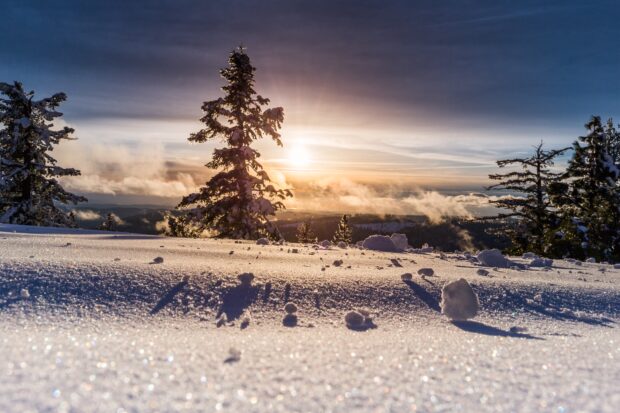You have no items in your cart. Want to get some nice things?
Go shopping
The door to the chamber slides shut; I can take off my respirator. I point to the gestural interface, and browse to select my experience:
solitary immersion >> storyless >> outdoors >>
winter >> woodland
For a few seconds, I’m suspended in shadowless green. Then suddenly I’m in a field, in a squall, on the edge of a stand of tall spruces. Their icy branches roar in the wind, crescendoing, descrescendoing…
*
I know that I’m not really “here,” in this imaginary countryside. That the scene is composed of rendered polygons, plus auditory, haptic, caloric, olfactory, and gustatory stimuli. But I allow myself to be convinced, seduced by the algorithmic drifts, because I want to believe they’re vestigial, a trace of the season we’ve lost. The air smells cold, and is. When the sky clears, the reflected sunlight is bright enough to hurt my eyes. As I walk, the snowpack gives way, but only to a point. Then it’s work to lift my feet.
*
The trees in this part of the forest have lost their leaves, which makes them difficult to identify. I study the dark wet boles, half-obscured by their own rimed limbs, and by the tapering, lustrous rods of ice that hang from the boughs. Each rod is a different length, like the resonators on a xylophone. They’re brittle, I learn. I break one off. It’s the thickness of a mouth.
*
I’ve seen my breath once before. I was on a porch, I’m not sure where—it’s one of those childhood memories that’s hard to place. The atmosphere wasn’t yet toxic. It was night. I think my dad had woken me up, to witness “condensation.” I could see my own exhalations, but they were very faint. My dad inhaled more deeply, deliberately, as if competing with an invisible rival. Then he expelled long, thick, linear clouds across the porch. They looked like fleecy vectors, or tunnels, or steam from an engine. I wish I could experience him, but the simulator isn’t good with people.
*
No one alive can say if this chillscape is authentic. Is this what it actually felt like, to move through a snowy forest? There’s always a clearing ahead, a corridor arranging itself, crossed by shadows. There are numerous patches of scat, and territorial bared owls. They produce a muted whooping (urr, urr, urr, urr-URR) that I’ve only just realized is indignant. Fearless magpies land in my tracks, probing the exposed ground for insects. I wonder, from time to time, if the designers have taken any liberties. Did pines ooze freezing sap? Was holly spined, and did it glitter? Could brooks really run in December? And were they so musical?
*
A chime lets me know that it’s almost over, this unprecedented sequence. Every tracing in the sandbox is strictly unrepeatable. They call it “intentional emergence:” the digital elements are yours to play with. The gales, the frost, the advancing fog, the candle ice barbing the streambanks.
*
As soon as I feel hunger, a meal appears. Scrambled eggs and pinto beans. I find them in a cast-iron pan suspended over a campfire, which, though it’s not exactly blazing, is still throwing sparks, unattended. Its small heat is welcome. As many have observed, it’s impossible to convince yourself that simulated food is “fake;” it’s so complex, and seemingly substantial. I tongue the skin of each bean, and note the smokiness of the eggs, the aroma of mesquite. I eat with my fingers, rinse them in snow, and warm them again. Although it’s not necessary, I spend a few minutes gathering dry twigs. I toss them into flames I know are maintained by a function, a system.
*
Flurries as dusk, then snowfall. I lounge beside a frozen pond, with my back to a tree trunk, entranced by the flakes. Each one stands out against the night sky, like the stars at Unilluminated Island, another storyless experience. But those constellations were static. Here, the flakes descend at different speeds, borne back and forth and even upwards, bunching and dispersing. Their motions reveal that the air is alive with stochastic currents. The little white streaks are countless, like the dead who looked on real snow. If this were my life, I’d have to decide: rise or be buried. I think of the prehistoric transhumanists who froze to death among alpine glaciers. Some of their bodies were later recovered accidentally, by hikers. The corpses were dried out and shrunken, but fleshed—what a privilege. If I perish here, in this nonexistent preserve, I am bound to awaken.
About Melissa Tuckman
Melissa Tuckman teaches in the English Department at Rowan University. Her writing has appeared in Tiny Molecules, Rust & Moth, and Feed.




